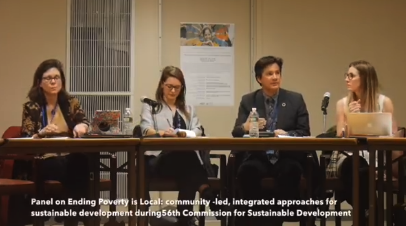 The nature of our world is multi-nodal and, with technology, today’s means of accountability, collaboration, communication and fulfillment of responsibilities are evolving to reflect integration. International development needs to catch up – quickly. Locus, Pact, Church World Service, and The Hunger Project – all members of the international Movement for Community-led Development – addressed this in a comprehensive discussion at the United Nations during the 56th Commission on Social Development.
The nature of our world is multi-nodal and, with technology, today’s means of accountability, collaboration, communication and fulfillment of responsibilities are evolving to reflect integration. International development needs to catch up – quickly. Locus, Pact, Church World Service, and The Hunger Project – all members of the international Movement for Community-led Development – addressed this in a comprehensive discussion at the United Nations during the 56th Commission on Social Development.
In looking at respective research and successes from integration, panelists and attendees identified a shared belief that integrated, community-led development is the effective and most dignified approach needed to achieve sustainable development for all. What ensued in discussion around means toward implementation was not typical banter about shifting funding streams and enabling conducive policy environments. Yes, of course that came up. But, robust discourse focused mostly on how development professionals should carry out their work by helping community members live authentically as thee leaders in our collaborative work toward the SDGs.
“When people tell me they will build capacity of communities, I say, ‘Who told you the community doesn’t have capacity?’” MacBain Mkandawire, Executive Director, Youth Net and Counseling, revealed the most obvious “secret” to development professionals: communities already have the capacity [and thirst] to incur their sustainable development. Our work should aim to compliment work already happening at the local level through collaboration with community leaders, not competition or programmatic control over them.
“People say, let us give voice to the voiceless. Well, they are not voiceless. We just haven’t talked to them.” Oyebisi Ohuseyi, Executive Director of Nigeria’s Network for NGOs, revealed the second “secret”: community members already behold opinions, grievances, solutions and priorities. In order to foster true ownership and agency, community partners should be the ones prioritizing which development issues matter most to them. And inarguably, communities have the deepest knowledge of their context and can offer the best insights on [most appropriate] ways forward.
Mkandawire added “Before we go to donors, we should be asking ourselves what do we need to change [in our work as development professionals]?” He was acknowledging that there are multiple layers of power and privilege toward realizing community-led development.
Therefore, the development community and its many stakeholders are called to move from the less helpful “outside expert-driven” tendencies and donor pandering toward budgeting and programs with a bedrock of fostering community agency and expertise. Ultimately, this means we need a new kind of capacity development professional: one able to convene, befriend, facilitate, energize, accompany, co-learn, and co-create with community members “with [sincere] reverence and respect.”
The discussion also brought attention to unrealistic time constraints and reporting windows that strap capacity, ultimately hindering sustainable change. Even incremental progress is valuable and worthwhile, as was described by a woman from and working in Nepal. She detailed an extensive self-managed cooperative thriving with over 1,000 members—but mostly after 18 years of incremental progress.
In reflecting on the discussion, the panel moderator, Ellie Price, Coordinator of Locus Coalition, noted “It is easy to get bogged down in the technicalities of our work, or the limitations imposed by global power structures.” This makes it near impossible to represent and act on views or experiences other than your own.
The event’s discussion shed action-oriented light. Members of the Movement for Community-led Development are dedicated to mobilizing and collaborating with local community leaders. Bringing government ownership to community-led processes is the Movement’s current priority to achieve sustainable development.
Rattling top-down power structures among stakeholders and influencing strongly devolved political systems will not only garner community leadership, but also community ownership and due dignity as people – rightfully so – steer their own development process.

